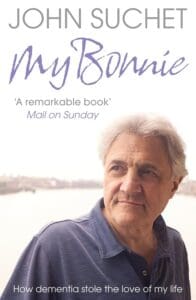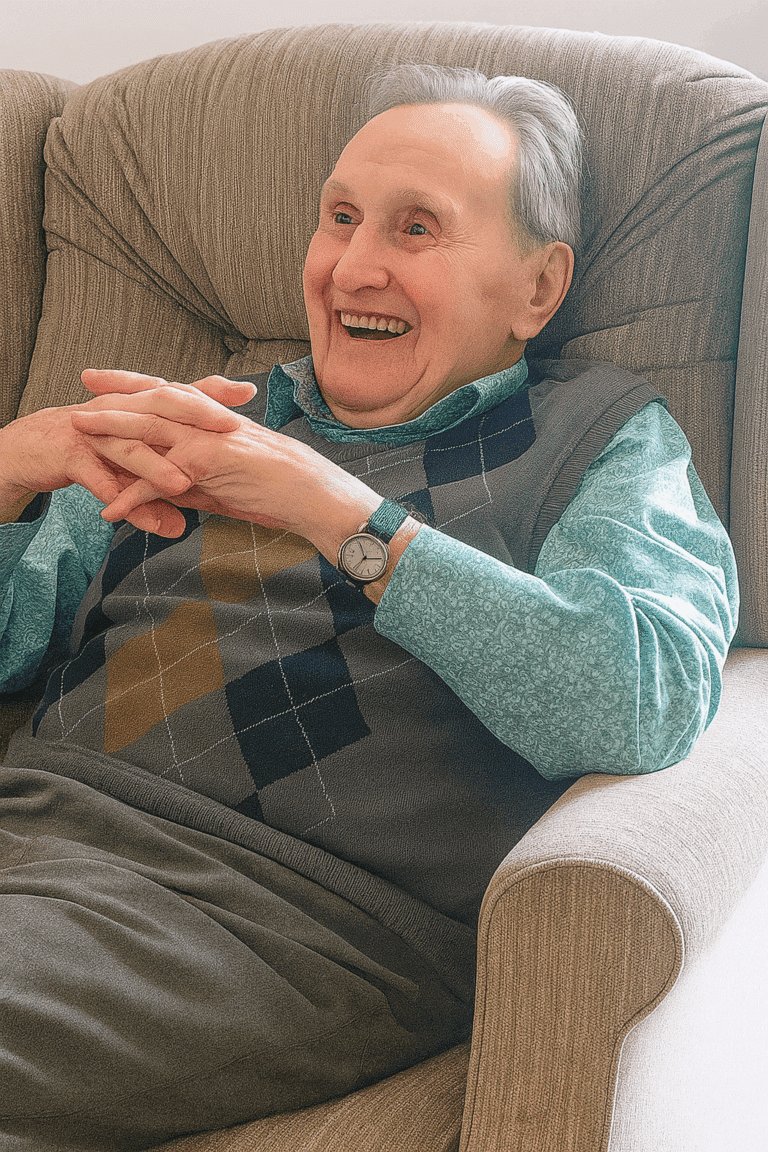A must-read book for anyone worried about a loved one struggling with dementia and want to know about live-in dementia care – my bonnie!
In this eminently readable and commendably honest book, My Bonnie, the journalist and broadcaster, John Suchet, combines the story of his chequered, but ultimately very successful TV career with an account of his blissfully happy marriage to his second wife, Bonnie. Blissfully happy, that is, until both their lives were turned upside down when Bonnie developed dementia in her early 60’s.
Bonnie was an American, born in New Jersey, who came to the U.K in her mid 20’s and first met John when they were living as neighbours in Henley on Thames. Although both already married to someone else and both with children, they fell deeply in love and after a long period of soul-searching, they each decided to divorce and start a new life together, finally marrying in June 1985.
John went on to enjoy a highly successful career as a TV journalist and newscaster, while Bonnie worked as the London-based PA of a multi-millionaire, globe-trotting US businessman.
Then, out of the blue, in the summer of 2004 and after nearly 20 years of wonderfully happy married life, John began to notice signs that Bonnie, then in her early 60’s, was beginning to suffer occasional but troubling memory lapses and bouts of complete confusion.
The first of these happened at Stansted Airport, when they were on their way to their holiday home in south-west France. Bonnie disappeared to a nearby ladies, but when she hadn’t returned after more than 15 minutes, John began to panic. A short time later he was summoned by tannoy to the information desk, where he was reunited with a happy and smiling – but also mildly confused – Bonnie.
When a few months later Bonnie’s son confided to him that he was worried about his mother appearing increasingly confused, John took Bonnie to see her GP. He conducted a series of basic cognitive and reasoning exercises, such as remembering the date, explaining where the consultation was being held, naming the Prime Minister, spelling words backwards, counting down from 100, naming as many animals as possible beginning with a given letter and remembering at the end of the session three words given to her at the beginning. Bonnie had no trouble with any of these tests apart from one: she was not able to correctly spell the word “world” backwards.
John’s anxieties were largely allayed by her GP and their lives then continued relatively untroubled until November the following year, when Bonnie passed out in a restaurant while they were on holiday in the US. After a series of initial tests, the doctors mentioned to John the possibility of Alzheimer’s and recommended that Bonnie undergo further tests on their return to the UK. Back in London John arranged for Bonnie to see a neurologist, who arranged an MRI scan. This provided strong evidence that Bonnie was probably suffering from Alzheimer’s. She was prescribed Aricept, a drug which improves the function of nerve cells in the brain and therefore aids the processes of memory, thinking, and reasoning. Bonnie herself remained completely unaware of her diagnosis, although she was by now becoming increasingly reliant on John.
Despite his hectic schedule as a TV newscaster, John was determined to care for his wife himself and, with the support of an Admiral Nurse, (What is an Admiral Nurse and how can they help? – Dementia UK) he successfully cared for Bonnie himself for nearly four years. When it eventually became clear that it was no longer safe for Bonnie to be left on her own at all, John decided that the best type of care for her would be 24-hour live-in care, and so he engaged the services of a Polish carer called Monika. This worked well for over two years, but eventually Bonnie’s condition became so severe that John realised it was no longer safe for her to be at home, even with live-in dementia care. It was thus with a heavy heart that he arranged for Bonnie to go into a care home in Berkshire. Despite his own misgivings, Bonnie herself adapted amazingly well to her new environment.
John during my bonnie tells this story with love and compassion, although he is also commendably honest in admitting to occasional fits of exasperation, caused, he confesses, by his failure to understand and accept that his wife, because of her dementia, was often extremely confused and simply could not help her often strange and sometimes challenging behaviour.
The book is both a heart-warming love story and a sober and realistic account of the effects that dementia can have, not only on the sufferer, but also on their long-term spouse or partner. Despite the sadness that tinges the narrative towards the end, my bonnie is nevertheless a most enjoyable and rewarding read.




